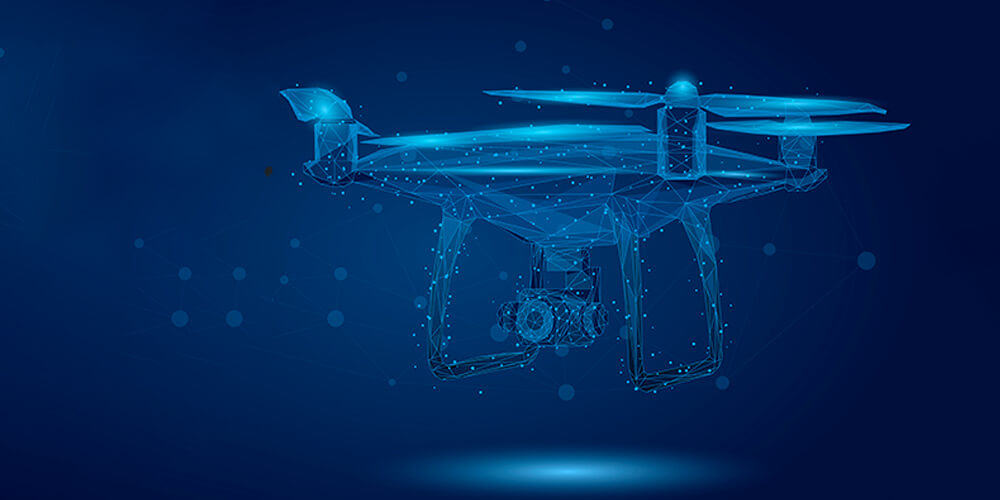AI to enhance the drone engineering
Artificial intelligence has been an omnipresent, ever-expanding technology. With its applications in almost all industries, AI as a technology has proved to be a helping aid and has benefited the industries’ implementing AI in any way.
AI has contributed to all sectors be it healthcare, manufacturing, technology, or even defense, it has been excelling in its capabilities. When it comes to precision, the implementation of AI technology comes out to be the best decision. One such precision-needed industry is drone technology.
What are drones?
Drones are unmanned aerial vehicles that can be utilized for several tasks. These gadgets were initially controlled manually and remotely. But nowadays, artificial intelligence is frequently included in drones, automating some or all tasks. Drone suppliers can gather and exploit visual and environmental data by using data from sensors attached to the drone in combination with AI.
By enabling autonomous or aided flight, this data increases accessibility and facilitates operation. Drones are now commercially available to businesses and individuals as a part of smart mobility services. Drones powered by AI mostly rely on computer vision. They can now detect items while in the air and analyze and record data on the ground thanks to this technology.

What is the role of AI in drone technology?
It is more crucial than ever before to sustain continuous efficiency and communication as the potential of artificial intelligence (AI) and the affordability of drones increases. A drone must also be able to fly farther without the assistance of a person and outside the pilot’s line of sight.
Although they are still in the early phases of research, AI-powered drones have the power to completely alter the way humans think. As technology advances, artificial intelligence (AI) is being used more frequently in drones. AI is playing a significant role in the increasingly autonomous nature of drones.
Certain organizations such as SAP, are also contributing to the automation of AI technology, and SAP certainly comes out to be a major contributor. SAP with its SAP managed services and SAP consulting services is enabling AI technology contributors to implement their technology into drone technology.
Drones having AI capabilities can make judgments in real time without human involvement. This is especially helpful in instances like search and rescue missions or disaster relief activities where time is of the essence. They can maneuver through confined spaces and avoid obstacles thanks to AI. When flying in congested regions with low visibility, this is tremendously beneficial.
What has automation contributed?
In recent events, there have been collaborations between SAP and other partners for automating drone technology. With the implementation of SAP 4 HANA and other SAP-managed services, automation has been elevated to a new level. Automation of drones with AI has several benefits.
- It gives the operator more time to concentrate on other activities like ensuring the drone is aimed in the appropriate direction and scanning its surroundings for dangers.
- It can aid the drone in avoiding hazards and making decisions in challenging circumstances.
- It can make it possible for the drone to fly in formation with other drones, which is especially helpful for military applications.
Applications of AI-enabled drones
Automation has led drone technology to a different level, where this technology can be implemented in all sectors and not just be limited to defense. The platform offers the visual intelligence driven by AI necessary to carry out image identification and risk prioritization. A highly-performing data platform is needed to handle huge amounts of data; in this case, that platform is SAP 4 HANA, which supports in-memory performance, can handle streaming data in real-time, and can also execute predictive analytics.
Automated drone technology has also been applied in several other segments as well, such as:
- Healthcare
- Agricultural
- Warehouse
- Construction
- Shipping
- Sensors
- Computer vision
Advantages of AI-enabled drone technology
- Real-time data streams can now be analyzed in-flight thanks to AI. This gives internal systems and operators constant feedback, allowing for automated flight operations corrections or complete automation.
- When AI is included in drone systems, it can be used to gauge operator effectiveness and gather information on operational circumstances. The development of operator training programs can then make use of this data.
Drones may only require artificial intelligence for them to develop into a cross-industry solution. AI-based drones can constantly recognize and analyze their surroundings and respond appropriately since they are outfitted with computer vision and innovative sensors. These skills are essential for applications in military and defense, as well as search and rescue.
Conclusion
Overall, AI is improving the effectiveness and efficiency of drones, both in terms of the information they can collect and the tasks they can perform. We can anticipate seeing even more incredible applications of AI as drone technology advances.
With technologies such as SAP 4 HANA and other SAP-managed services, AI-enabled drone technology is meant to excel and experience rapid growth.
Drones will be utilized shortly to collect sensitive data that can be used for weather forecasting, storm tracking, and precision agriculture. Even monitoring can be accomplished with them, particularly in search and rescue. We’re headed in the right direction toward a future in which drones can support themselves.





